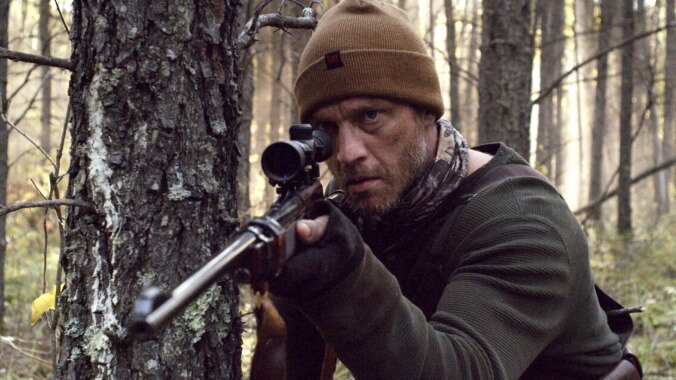The grim and grisly Hunter Hunter earns its unforgettable ending


Note: The writer of this review watched Hunter Hunter on a digital screener from home. Before making the decision to see it—or any other film—in a movie theater, please consider the health risks involved. Here’s an interview on the matter with scientific experts.
“This is a hard life.” It’s an understatement. Surrounded by trees, ravines, and plenty of sharp-fanged critters, Anne (Camille Sullivan) and her family reside in the remote wilderness, living primarily off the meat and fur her husband fetches from the forest. In the evenings, Joseph (Devon Sawa) guts and skins creatures big and small as 12-year old Renée (Summer H. Howell) watches. From pelt to bone to innards, no part is wasted, yet it’s not enough to sustain a lifestyle no longer valued by American capitalism. Pelts sell for a fraction of what they once did. Supplies, meanwhile, grow more expensive by the year. On top of it all is the wolf, a recurring thorn in Joseph’s side. Big and mean, it returns time and again to plunder their traps, jaws scooping up the family’s last hope for survival.
It’s clear from the get-go that Hunter Hunter, the third feature from writer and director Shawn Linden, will pit man against beast. The strange, unexpected shape his film takes, though, distinguishes it from gritty survival stories like The Grey and The Edge. The wolf is only a strand of the predatory web that’s been spun outside this home, and Joseph’s efforts to uncover its source leave him lost amongst the trees. That leaves Anne and Renée to care for both their cabin and Lou (Nick Stahl), an injured photographer whose screams wake them. As dead of night bleeds back into day, the shadows of new predators begin to eclipse that of the big, bad wolf.
Hunter Hunter’s narrative pivot is key to its success, but Linden still struggles to bridge the muted world-building and tense familial drama of its early scenes with the gut-churning nightmares that precede its bloody climax. Just as Joseph stumbles upon the dark secrets tucked within his land, the film hitches us to a pair of local authorities who broaden the world without bringing much else. As they grapple with vacationing yuppies and, eventually, a paranoid Anne, the narrative stalls, reminding us that there are much, much more interesting things happening offscreen. What the film doesn’t show, however, soon proves to be as intentional as what it does.
Sawa, making fine use of the brawny frame he’s grown into, is gripping as the methodical Joseph, the respect with which he disassembles his catches saying more than a monologue ever could. A captivating Stahl, meanwhile, unnerves as the unexpected arrival, his drawn, lined face unknowable behind a grin that’s plenty wolfish on its own. It’s Sullivan, however, who has the firmest grasp on her character. As a woman exhausted by her husband’s isolated, increasingly obsolete lifestyle, she exudes a weariness that dissolves only in moments of crisis. The screams coiled within her are positively primal, more effective on an encroaching predator than a cocked .22.
And, boy, does she ever get to flex that scream. As Linden’s feature barrels towards its vicious end, the cruelty baked into it becomes more and more apparent. A searing (and not unjustified) layer of cynicism coats what at first appears to be a story of man’s place in nature; what we’re really watching is one about death—both in the literal and figurative sense—and the gulf that exists between hunting for survival and killing for the hell of it. It’s a jarring journey, filled with twists that snap and sting like bear traps, and an endurance test, too, especially for the squeamish. Linden lingers as much on roadkill as he does on careful dissection and disembowelment, a juxtaposition of the chaotic and the purposeful. When do those lines blur?
We find out in the film’s unforgettable final minutes, a prolonged (and deeply cathartic) sequence that’s nasty enough to challenge even the most seasoned gorehounds. Punishing as it is, though, the explicitness transcends mere shock value, colliding an act of survival with one of passion, challenging binary notions of what makes a predator. More than anything, the ending reminds us that, man or animal, we are made of the same blood, muscle, bone, and meat.